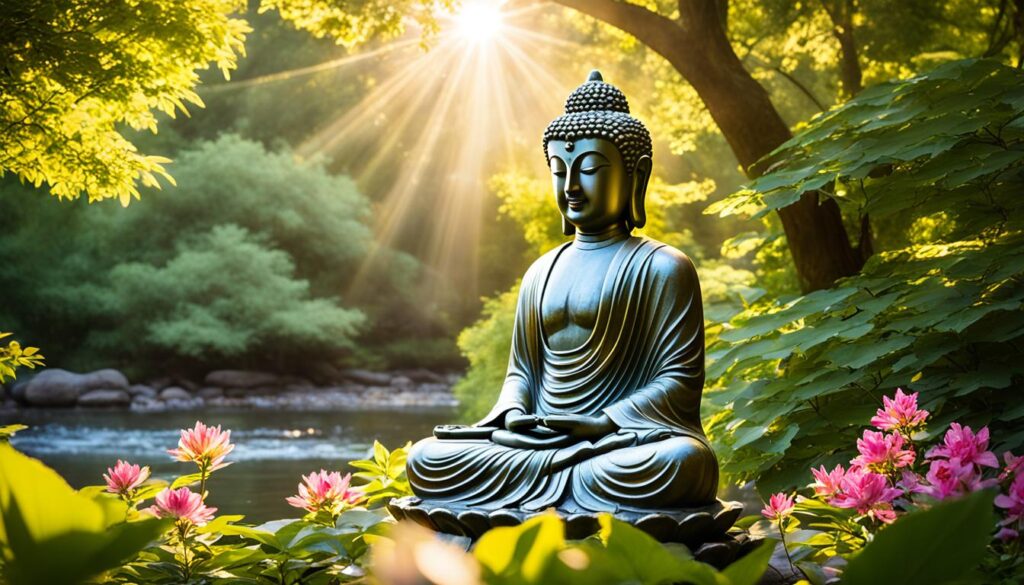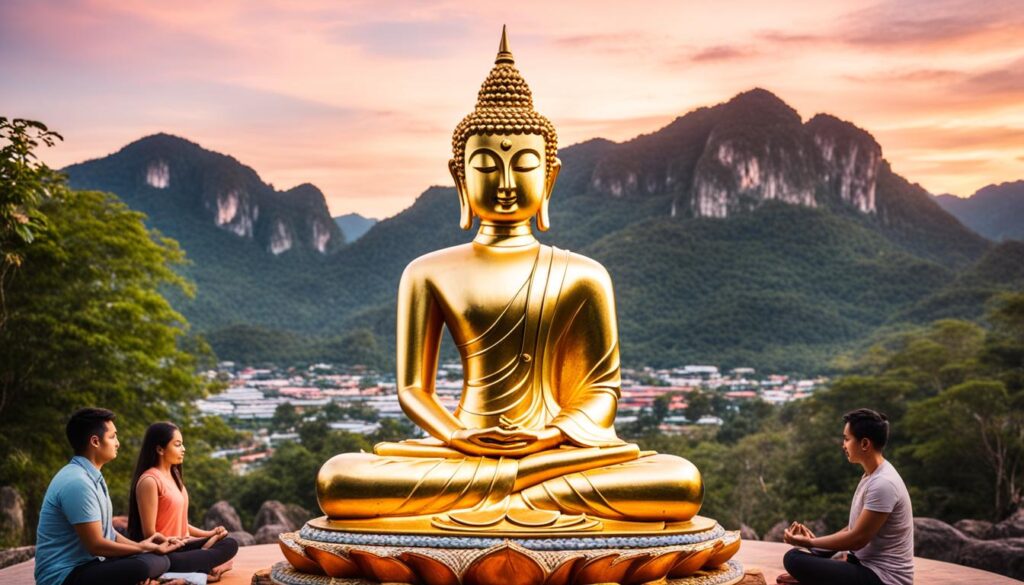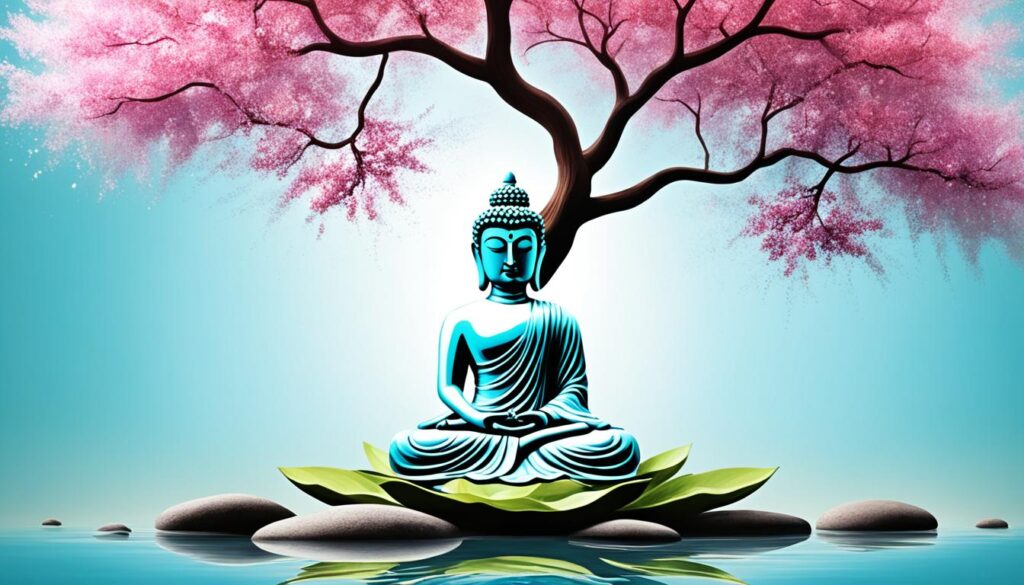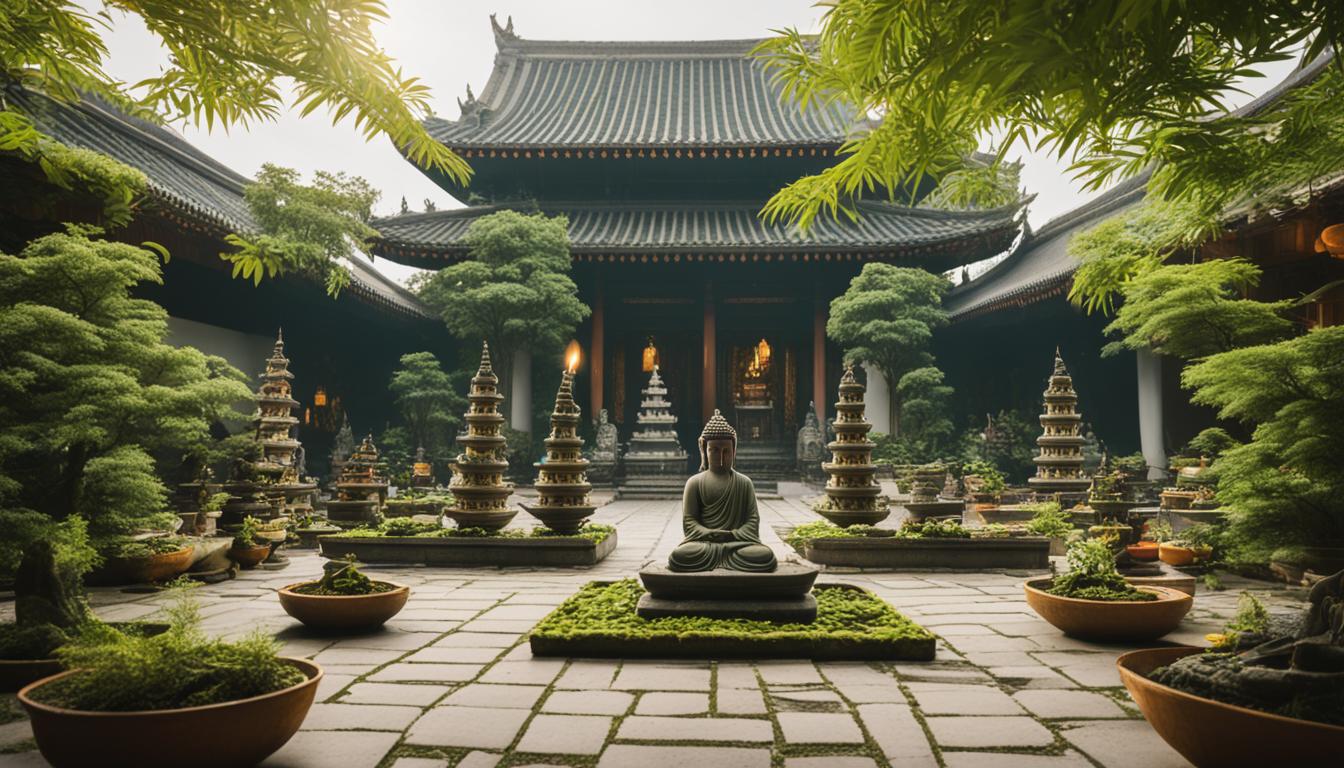Are you searching for inner peace and balance in your life? Look no further than Thai Buddhism. With its rich traditions and practices, Thai Buddhism offers a pathway to serenity and spiritual growth. Discover the power of deep meditation, mindfulness, and the wisdom of Thai Buddhist teachings. Are you ready to embark on a transformative journey towards inner peace?
Key Takeaways
- Thai Buddhism provides practices that promote serenity, mindfulness, and spiritual growth.
- Deep meditation is a powerful tool to quiet the mind and cultivate inner peace.
- Exploring the traditions of Thai Buddhism deepens your understanding of its impact on daily life.
- Thai Buddhist meditation brings tranquility, clarity, and a deeper connection to the present moment.
- The teachings of compassion and loving-kindness foster personal growth and contribute to a more harmonious society.
The Significance of a Buddha Statue in Thai Buddhism
A Buddha statue holds immense significance in Thai Buddhism, symbolizing enlightenment and spiritual awakening. Incorporating a Buddha statue into your home or meditation space can serve as a powerful reminder to cultivate mindfulness, engage in meditation practices, and seek inner peace.
The serene and tranquil presence of the Buddha statue serves as an anchor for your practice, inspiring you to embark on a journey of self-discovery and spiritual growth. By gazing at the statue, you are reminded of the potential that lies within to achieve enlightenment and transcend the challenges of the world.
The Buddha statue represents the ultimate state of awakening and enlightenment that all practitioners strive to attain. Its serene countenance and meditative posture inspire a sense of peace and calm. Just as the Buddha found enlightenment under the Bodhi tree, the presence of the statue can inspire you to cultivate mindfulness and seek the path to inner liberation.
The Power of a Buddha Statue
Having a Buddha statue in your meditation space creates an atmosphere conducive to deep introspection and self-reflection. It serves as a focal point during your meditation practice, enabling you to channel your focus and attention as you embark on a journey of self-discovery.
The statue’s presence beckons you to embrace a state of mindfulness, to become fully aware of your thoughts, emotions, and sensations in the present moment. By practicing mindfulness in the presence of the Buddha statue, you can develop a deeper connection with your inner self and find solace in the stillness.

The image above depicts a stunning Buddha statue, radiating a sense of tranquility and enlightenment. Placing a Buddha statue in the center of your meditation space can create a visually calming focal point, aiding your journey towards inner peace and spiritual awakening.
Beyond its visual appeal, the statue acts as a tangible representation of the teachings and wisdom of the Buddha. It serves as a constant reminder of the path towards enlightenment, urging you to cultivate compassion, mindfulness, and loving-kindness in your everyday life.
Whether you are a seasoned practitioner or new to Thai Buddhism, having a Buddha statue in your space can provide inspiration and guidance along your spiritual journey. Its presence serves as a beacon of hope, reminding you of the potential for transformation and awakening that lies within each and every one of us.
Exploring Thai Buddhist Temples and Traditions
Thai Buddhist temples, or “Wats,” are sacred spaces that hold deep significance in Thai culture and spirituality. These temples are not just places of worship, but also centers for meditation, learning, and community engagement. Thai Buddhist temples offer a unique opportunity to immerse yourself in the rich traditions and vibrant culture of Thai Buddhism.
Thai Buddhist Temples: A Haven for Spiritual Connection
Thai Buddhist temples are renowned for their architectural beauty and serene ambiance. As you step into a temple, you are greeted by intricate designs, vibrant colors, and the scent of incense. The atmosphere immediately transports you to a realm of peace and tranquility, encouraging a deep sense of spiritual connection.
Within the temple grounds, you will find various structures that house sacred Buddha statues, relics, and scriptures. These statues serve as focal points for meditation and symbolize enlightenment, compassion, and inner peace. The presence of these statues inspires devotees to embark on their own spiritual journey.
Exploring Thai Buddhist temples allows you to witness and participate in traditional ceremonies and rituals that have been practiced for centuries. One such ceremony is the offering of alms to the monks. By making offerings of food and essentials to the monks, you not only support their spiritual endeavors but also cultivate generosity and humility within yourself.
Another integral aspect of Thai Buddhist temple culture is meditation. Many temples offer guided meditation sessions where you can learn and practice various meditation techniques under the guidance of experienced monks. These sessions provide an opportunity to calm the mind, cultivate mindfulness, and deepen your spiritual practice.
Thai Buddhist Traditions: Insights into a Vibrant Culture
Thai Buddhist temples are not just places of worship; they are also centers of cultural expression and preservation. Thai Buddhist traditions reflect the values, beliefs, and customs of the Thai people and offer a glimpse into their way of life.
Traditional Thai Buddhist ceremonies and festivals are vibrant and colorful, filled with music, dance, and elaborate processions. These celebrations showcase the deep devotion of the Thai people and their reverence for the teachings of the Buddha.
Chanting sessions are another significant practice in Thai Buddhist temples. Monks and devotees come together to chant scriptures and mantras, creating a harmonious and meditative atmosphere. These sessions foster a sense of unity and spiritual connection among participants.
By participating in these rituals and traditions, you gain a profound understanding of Thai Buddhist culture and its profound impact on daily life. You also develop a greater appreciation for the interconnectedness between spirituality, culture, and personal well-being.
Visiting Thai Buddhist Temples: A Transformative Experience
Experiencing Thai Buddhist temples and traditions firsthand is a transformative journey that offers spiritual growth, cultural immersion, and inner peace. By immersing yourself in the beauty and serenity of these temples and participating in meaningful rituals, you can deepen your understanding of Thai Buddhism and its teachings.
Are you ready to embark on a transformative journey? Visit a Thai Buddhist temple near you or plan a trip to Thailand to explore the rich heritage and traditions it has to offer.
| Benefits of Exploring Thai Buddhist Temples and Traditions |
|---|
| Deepens understanding of Thai Buddhism |
| Provides a space for meditation and spiritual growth |
| Celebrates the vibrant culture and traditions of Thailand |
| Fosters a sense of community and interconnectedness |
| Promotes inner peace and serenity |
Thai Buddhist Meditation and its Benefits
In the fast-paced world we live in, finding inner peace and tranquility is essential for our well-being. Thai Buddhist meditation offers a pathway to cultivate mindfulness and discover a deeper connection to the present moment. Through the practice of meditation, you can quiet your mind, observe your thoughts without judgment, and experience a profound sense of inner peace.
Meditation is a powerful tool that has been scientifically proven to bring a wide range of physical, mental, and emotional benefits. Research has shown that regular meditation practice can reduce stress, improve focus and concentration, enhance emotional well-being, and promote overall mental clarity. It has also been found to have a positive impact on physical health, boosting the immune system and lowering blood pressure.
The Benefits of Thai Buddhist Meditation
Thai Buddhist meditation, rooted in mindfulness, offers specific benefits that can enrich your daily life. Let’s explore some of these benefits:
- Mindfulness: Thai Buddhist meditation helps you develop a keen awareness of the present moment, allowing you to fully experience each passing breath and embrace the beauty of the present.
- Tranquility: By practicing Thai Buddhist meditation, you can enter a state of deep tranquility, freeing yourself from the stress and chaos of the outside world.
- Inner Peace: Through meditation, you can connect with your inner self, accessing a profound sense of peace and harmony that transcends the challenges of daily life.
- Emotional Balance: Thai Buddhist meditation cultivates emotional intelligence and equanimity, enabling you to respond to life’s ups and downs with greater clarity and resilience.
Beyond these immediate benefits, Thai Buddhist meditation is a transformative practice that can lead to profound personal growth and spiritual awakening. It allows you to deepen your understanding of yourself and the world around you, fostering a sense of interconnectedness and unity.

The Teachings of Compassion and Loving-Kindness in Thai Buddhism
Thai Buddhism places a strong emphasis on compassion and loving-kindness. The teachings of the Buddha encourage practitioners to extend these qualities towards oneself and others. By cultivating compassion and loving-kindness, practitioners promote personal growth and contribute to a more harmonious society.
Loving-kindness meditation is a practice deeply rooted in Thai Buddhism. This form of meditation involves directing positive thoughts, intentions, and well-wishes towards oneself and all beings. It fosters a sense of interconnectedness and unity, recognizing that we are all inherently connected and deserving of love and kindness.
Through the practice of loving-kindness meditation, individuals develop a genuine sense of compassion towards themselves and others. It allows practitioners to cultivate empathy, understanding, and forgiveness. This practice helps break down barriers, strengthens relationships, and promotes a more compassionate society.
Compassion and loving-kindness are not only beneficial to others but also to oneself. Research shows that practicing compassion can enhance overall well-being, reducing stress and promoting psychological resilience. When we extend compassion to others, we experience a sense of interconnectedness and unity, enhancing our own sense of purpose and fulfillment.
Embracing the teachings of compassion and loving-kindness allows individuals to navigate the challenges of life with grace and understanding. By cultivating these qualities, practitioners develop a greater capacity for empathy and find solace in the interconnectedness of all beings.
The Benefits of Compassion and Loving-Kindness
| Benefits | Description |
|---|---|
| Stress Reduction | Practicing compassion and loving-kindness has been found to lower cortisol levels, reducing stress and promoting emotional well-being. |
| Enhanced Relationships | Developing compassion and loving-kindness helps build stronger and more meaningful relationships, fostering a sense of unity and understanding. |
| Increased Happiness | Acts of kindness and compassion boost the production of feel-good hormones, leading to increased feelings of happiness and fulfillment. |
| Improved Mental Health | Practicing compassion and loving-kindness has been linked to lower rates of depression, anxiety, and stress-related disorders. |
| Spiritual Growth | By cultivating compassion and loving-kindness, individuals deepen their spiritual connection and experience a sense of unity with all living beings. |

Through the teachings of compassion and loving-kindness, Thai Buddhism offers a transformative path towards personal growth and societal harmony. By incorporating these principles into our lives, we foster a deeper understanding of ourselves and our interconnectedness with all beings. The practice of compassion and loving-kindness not only brings us closer to others but also cultivates a greater sense of compassion, empathy, and unity within ourselves.
Addressing Modern Challenges with Thai Buddhist Insights
The teachings of Thai Buddhism offer valuable insights for navigating the challenges of modern life. Through mindfulness practices, individuals can cultivate a sense of presence and awareness, allowing them to better cope with stress, anxiety, and overwhelm.
Practicing mindfulness involves anchoring yourself in the present moment, observing your thoughts and emotions without judgment. By bringing attention to your breath, sensations, and the environment around you, you can develop a greater sense of clarity, calm, and resilience.
Mindfulness also helps foster compassion and understanding towards oneself and others. It encourages individuals to cultivate empathy and kindness, promoting harmonious relationships and a greater sense of interconnectedness.
By incorporating mindfulness and compassion into daily life, individuals can nurture their personal growth and contribute to a more compassionate and harmonious society. These practices allow for greater self-awareness and a deeper understanding of oneself and others, leading to improved communication, empathy, and conflict resolution.
Benefits of Mindfulness and Compassion:
- Reduced stress and anxiety
- Improved emotional well-being
- Enhanced focus and concentration
- Increased empathy and understanding
- Enhanced resilience and adaptability
- Promotion of harmonious relationships
- Cultivation of personal growth and self-compassion
By incorporating Thai Buddhist insights into your daily life, you can navigate the challenges of the modern world with greater ease and grace. Cultivating mindfulness, compassion, and personal growth allows you to find harmony within yourself and contribute to a more harmonious and compassionate society.

Conclusion
Embracing the practices of Thai Buddhism offers a transformative journey towards spiritual growth, mindfulness, and inner peace. By incorporating these ancient teachings into your daily life, you can find serenity amidst the chaos of the modern world.
At the core of Thai Buddhism is the practice of meditation, which allows you to quiet your mind, observe your thoughts, and develop a deep connection to the present moment. Through regular meditation, you can cultivate a sense of tranquility, clarity, and inner peace.
Exploring the traditions and rituals of Thai Buddhist temples, known as “Wats”, offers a profound understanding of Thai culture and spirituality. These sacred spaces provide an opportunity for worship, reflection, and learning. Engaging in traditional ceremonies and practices, such as offering alms to monks and joining meditation and chanting sessions, deepens your connection to the rich heritage of Thai Buddhism.
Incorporating the teachings of compassion and mindfulness into your daily life is another fundamental aspect of Thai Buddhism. By practicing loving-kindness meditation and extending positive intentions towards yourself and all beings, you foster a sense of interconnectedness and unity. This cultivation of compassion not only promotes personal growth but also contributes to a more harmonious society.
Thai Buddhism is a profound pathway to personal and societal harmony. It equips individuals with the tools necessary to address modern challenges, navigate the complexities of life, and cultivate a lasting sense of inner peace. Begin your journey towards serenity and spiritual growth by embracing the practices of Thai Buddhism today.
FAQ
How can Thai Buddhism practices help me find serenity and inner peace?
Thai Buddhism practices, such as meditation and mindfulness, promote serenity, mindfulness, and spiritual growth. By incorporating these practices into your life, you can find balance and cultivate inner peace.
What is the significance of a Buddha statue in Thai Buddhism?
A Buddha statue serves as a powerful symbol of enlightenment and spiritual awakening in Thai Buddhism. Having a Buddha statue in your home or meditation space can inspire mindfulness, meditation, and the cultivation of inner peace.
What role do Thai Buddhist temples play in Thai culture and spirituality?
Thai Buddhist temples, or “Wats,” are an integral part of Thai culture and spirituality. They provide a space for worship, meditation, and learning. Traditional ceremonies, such as offering alms to the monks, offer insights into Thai Buddhist traditions.
How does Thai Buddhist meditation promote inner peace?
Thai Buddhist meditation practices focus on mindfulness and cultivating inner peace. Through meditation, practitioners can quiet their minds, observe their thoughts without judgment, and develop a deeper connection to the present moment, bringing tranquility and clarity.
What teachings of Thai Buddhism emphasize compassion and loving-kindness?
Thai Buddhism places a strong emphasis on compassion and loving-kindness. The teachings of the Buddha encourage practitioners to extend these qualities towards oneself and others. Loving-kindness meditation fosters a sense of interconnectedness and unity.
How can Thai Buddhist insights help address modern challenges?
The teachings of Thai Buddhism offer valuable insights for navigating the challenges of modern life. Mindfulness practices can help individuals cope with stress, anxiety, and overwhelm. Compassion and loving-kindness teachings promote empathy, understanding, and harmonious relationships.
What are the benefits of embracing Thai Buddhism practices?
Embracing the practices of Thai Buddhism can lead to spiritual growth, mindfulness, and inner peace. Through meditation, exploration of traditions, and embodying the teachings of compassion and mindfulness, individuals can find serenity in a fast-paced world.

